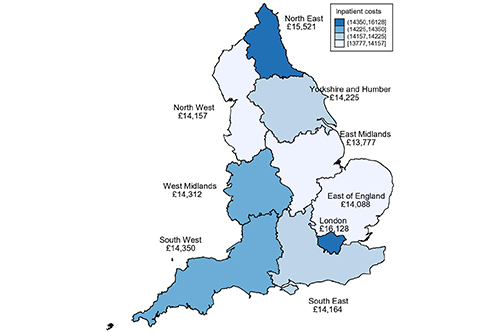The study, led by the University of Bristol and funded by Versus Arthritis, highlights the urgent need for evidence-based quality improvement strategies to reduce healthcare spending and improve patient outcomes in the year following a hip fracture. The research is published online in The Lancet Healthy Longevity today [10 July].
Hip fracture is a serious health concern, with more than 70,000 older adults admitted to a UK hospital each year. This study highlights the high healthcare burden associated with breaking a hip.
The research analysed data from national databases for 178,757 hip fracture patients aged 60 years and above in England and Wales, who broke their hip between 2016 and 2019, followed up to just before the pandemic. More than one in four patients died within a year of their hip fracture.
Patients spent an average of 32 days in hospital in the year following a hip fracture, resulting in substantial inpatient costs of on average £14,642 per patient – a cost similar to that incurred in the year after a stroke, and that exceeds costs of many common cancers. But this cost varied substantially between hospitals, with more than a two-fold difference in spending, ranging from £10,867 to £23,188 per patient, between 172 NHS hospitals studied in England and Wales.
The researchers identified that in hospitals where patients are up and about quickly after their operation and where physiotherapy is provided seven days a week, patient costs were lower, and patients spent fewer days in hospital in the year following hip fracture.
The research further highlighted the crucial role of orthogeriatricians - consultant geriatricians who specialise in the care of people with fractures - in hip fracture care.
Dr Petra Baji, Senior Research Associate in Health Economics at Bristol Medical School: Translational Health Sciences (THS) and the paper's first author, explained: "The findings suggest that having all patients assessed by an orthogeriatrician within the first days of admission could cut healthcare spending by £529 per patient, as well as reduce the chance of dying by 15% in the year following hip fracture."
Dr Rita Patel, Senior Research Associate in Medical Statistics at Bristol and statistician for the study, added: "If a consultant orthogeriatrician attends hospital clinical governance meetings, a further cost saving of £356 per patient could potentially be achieved, as well as patients spending fewer days spent in the hospital in the year following hip fracture.”
"Hospitals with fracture liaison services also have lower mortality rates and patients spend fewer days in hospital. Our study suggests that rather than increasing the burden on the NHS, providing additional care for patients with orthogeriatrician and fracture liaison services may actually improve NHS efficiency."
The study highlights the importance of addressing the way hospitals deliver hip fracture care to improve the effectiveness and efficiency of hip fracture services, and the need to develop evidence-based quality improvement strategies across the UK, to achieve financial savings while also improving patient outcomes.
Celia Gregson, Professor in Clinical Epidemiology in the Musculoskeletal Research Unit at the University of Bristol and Chief Investigator of the study, commented: "The variation we have seen in patient outcomes and health spending following hip fracture are difficult to justify on purely clinical grounds, it tells us that the way we organise the delivery of care can be improved nationally.
"By prioritising orthogeriatrician assessment, getting patients out of bed promptly after surgery, providing seven-day physiotherapy, reducing delirium risk for patients, and holding monthly multidisciplinary clinical governance meetings, hospitals stand to improve patient outcomes and reduce their healthcare spending."
Caroline Aylott, Head of Research Delivery at Versus Arthritis, said: "This research shows the unacceptable state of care for older people who break their hip. The findings show that older people have a high chance of dying within a year of a hip fracture, and that quality of care varies hugely between NHS hospitals in England and Wales.
"As hip fractures mainly affect older people, many of whom live with multiple long-term conditions, this research suggests we are not getting older people's care right. That must change.
"The study found that better, faster access to orthogeriatricians and fracture liaison services would not only reduce people's risk of dying and improve chances of a better recovery, but also reduce NHS spending. Just weeks after publication of the NHS workforce plan, the study provides yet further evidence of the desperate and immediate need for a properly resourced NHS."
The research team has already developed a potential solution, after working with the Royal Osteoporosis Society to develop an innovative toolkit – REDUCE hip fracture service implementation toolkit – informed by the results of their research.
The toolkit is freely available to all healthcare professionals and service managers to support the quality improvement of fracture service provision within the 172 acute hospital settings across England and Wales.
This study follows previous work from the REDUCE study (REducing unwarranted variation in the Delivery of high-qUality hip fraCture services in England and Wales), published last year in Age and Ageing, the journal of the British Geriatrics Society, which focused on patient outcomes of hip fracture patients in the short term.
The study was funded by Versus Arthritis (ref: 22086), the UK's biggest charity supporting people with arthritis and musculoskeletal conditions, and supported by the National Institute for Health and Care Research Bristol Biomedical Research Centre (NIHR Bristol BRC).
Paper
'Organisational factors associated with hospital costs and patient mortality in the 365 days following hip fracture in England and Wales (REDUCE): a record-linkage cohort study' by Petra Baji, Elsa M R Marques, Celia L Gregson et al. in The Lancet Healthy Longevity [open access]
